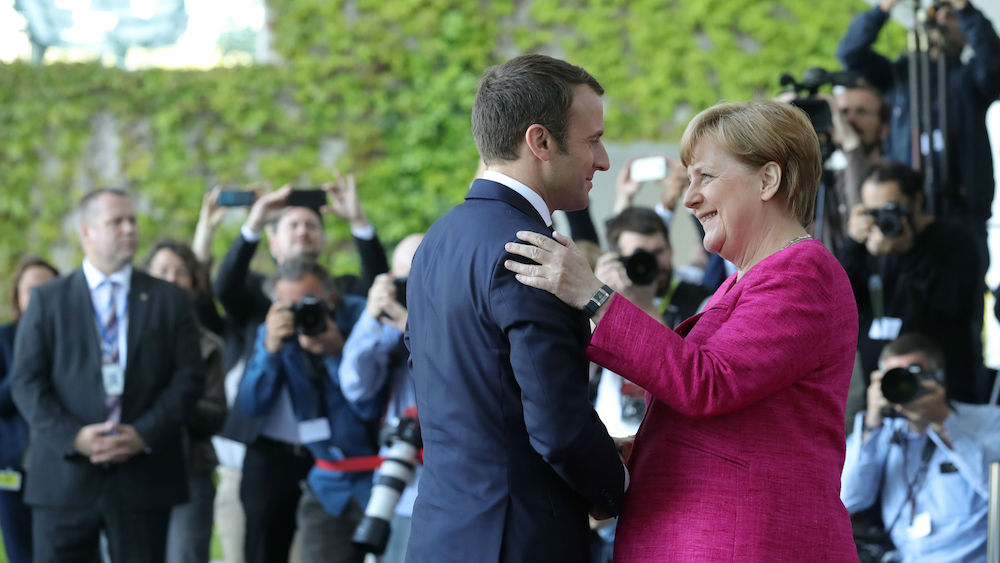Emmanuel Macron’s victory was meant to be the salvation of Europe, staving off the populists and – hopefully – reigniting the Franco-German engine powering the EU. But when it comes to specifics, the partners don’t exactly see eye to eye.
The sun is shining in Berlin for Emmanuel Macron’s inaugural foreign visit. His host, Chancellor Angela Merkel, has just one wish: that the sun will continue to smile on Berlin’s most crucial bilateral relationship, and that her fourth French president is the man to reform France – and, by extension, save Europe’s ailing Franco-German motor.
Macron’s three predecessors – the charming Jacques Chirac, the mercurial Nicolas Sarkozy, and the lame duck François Hollande – talked the reform talk but couldn’t walk the walk. That has left Berlin’s trust stretched and its patience wearing thin, leaving France’s youngest leader since Napoleon a kind of Gallic Ben Kenobi: the EU’s only hope.
“I haven’t the least doubt that we will work well together,” said Chancellor Angela Merkel after Macron’s election victory, before adding archly: “What France needs now is results.”
German officials note drily that, like his predecessors, Macron is no stranger to grand plans. Accompanying Hollande to Berlin in 2012 as an adviser, Macron pushed the president’s campaign promise of deficit spending to “reorient Europe.” Without Paris undertaking economic reforms, though, Berlin wouldn’t budge.
As sherpa a year later, he co-authored an 11-page Franco-German declaration of intent, promising more French reform as part of a wider quid-pro-quo of greater German public investment to stimulate pan-EU growth and even deeper eurozone integration. That plan disappeared into a draw amid revived euro crisis tensions.
In 2014 Macron was back with a “new deal” plan, promising that France would make €50 billion in public savings if Germany spent €50 billion more in public money to reduce its highly controversial trade deficit. Macron’s latest Franco-German reform-for-investment plan was given a cool reception by Merkel and her flinty finance minister Wolfgang Schäuble. He conceded in Saturday’s Der Spiegel that, at around 8 percent of economic output, Germany’s trade surplus is too high for its neighbors, but a solution is unlikely in the immediate future.
While France and others in Europe want Berlin to even out the trade imbalance with public investment, Schäuble insists that influencing the surplus is out of his hands, a consequence of the single currency and the competitiveness of German firms.
Upping the Game
So, as before, Germany’s answer to Macron is: We aren’t going to become less competitive. Instead, you must up your game. A decade after its own social and economic reforms, with the German economy booming, Berlin insisted it was in the French national interest to take a similar path.
In 2012, Macron’s description of the Franco-German dilemma drew nods of agreement in Berlin: he characterized the two partners as willing to dance, but in disagreement on the steps. But Berlin insists the steps are clear: Paris has to go first, and, until it brings its deficit below the euro area’s debt ceiling – three percent of GDP – there is nothing to talk about.
On Monday Merkel will repeat her good wishes for the French leader but, facing her own election season, will warn him not to ask for too much too soon. The most Macron can hope for at the end of Merkel’s third term is Berlin’s support for a European Monetary Fund, along IMF lines.
In a pre-emptive strike, Germany’s Bild tabloid last Tuesday suggested Macron’s previous European proposals – from EU joint sovereign debt “eurobonds” to joint bank guarantee schemes – “should sound the alarm.” For Germany’s center-right, too many French demands amount to the same thing: reform shortcuts bankrolled by Berlin.
For that reason, Macron is hoping that, by year-end, he will no longer have to deal with Chancellor Merkel. Social Democrat (SPD) challenger Martin Schulz, the former president of the European Parliament, has signaled greater openness to French concerns. “We have to use our strength more effectively to make our European partners stronger,” he said on news of Macron’s win. Unlike Merkel and Schäuble, the SPD leader agrees that it is not sustainable if Germany continues to export far more to its trade partners than it imports from them.
But, after a regional election disaster in North-Rhine Westphalia on Sunday, Schulz and the SPD are on a slippery downward slope in polls. That put strict limits on how far they can support Paris, given that ideas like eurobonds are a vote killer in Germany.
Berlin observers expect little progress for the rest of this year, given the uncertain outcomes of French and German parliamentary elections. Still, Macron’s presidency means a chance to at least restart Franco-German dialogue on eurozone issues, as well as on security and defense policy.
Across the German political landscape, the new French president enjoys huge goodwill and no small measure of hope in Berlin. But as they say here: hope dies last, but then it dies.







